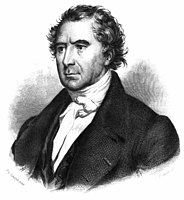French Executive Commission (1848)
| Executive Commission of 1848 | |
|---|---|
|
cabinet of France |
|

|
|
| Date formed | 9 May 1848 |
| Date dissolved | 24 June 1848 |
| People and organisations | |
| Head of government | François Arago |
| Head of state | Executive Commission members |
| History | |
| Predecessor |
Provisional Government of 1848, Jacques-Charles Dupont de l'Eure |
| Successor |
Cabinet of General Cavaignac, Louis-Eugène Cavaignac |
The Executive Commission of 1848 was a short-lived government during the French Second Republic, chaired by François Arago, that exercised executive power from 9 May 1848 to 24 June 1848. It succeeded the Provisional Government of 1848 and was in turn replaced by the Cabinet of General Cavaignac. The members of the Commission acted as joint head of state.
The Commission lacked support in the National Assembly. It soon found itself at odds with the conservative majority and effectively unable to properly govern. The closure of the National Workshops, by leading to the June Days Uprising, sealed the doom of the Executive Commission. Judging the Commission unable to quell the uprising, the Assembly effectively dissolved it on June 24 by a vote of no confidence and gave full powers to General Louis Eugène Cavaignac.
In May 1848 the National Assembly decided to establish the Executive Commission as a form of collective presidency, similar to that of Year III in the first French Revolution. The members were chosen from prominent members of the former Provisional Government. The members named to the commission by the Assembly on 9 May 1848 were François Arago (President of the Commission), Alphonse de Lamartine, Louis-Antoine Garnier-Pagès, Alexandre Auguste Ledru-Rollin and Pierre Marie de Saint-Georges. These members acted jointly as head of state.
Lamartine was seen by many as representing order and respect for property, while Ledru-Rollin stood for violence and communism. However, Lamartine used his strong popular mandate to force the National Assembly to make Ledru-Rollin one of the members of the Executive Commission. This greatly undermined his credibility. Lamartine's motives are unclear, but perhaps he was concerned that the power was swinging too far towards the Conservatives.
...
Wikipedia
